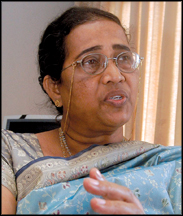Development through healthy ageing
Mrs. V. Jegarasasingham, Secretary to the
Ministry of Social Services and Social Welfare and Chairperson of the
National Council for Elders in an interview with the Sunday Observer
elaborates on challenges faced by Sri Lankan elders and the steps taken
by the Social services and Social Welfare Ministry to uplift the
condition of elders.
by Samangie WETTIMUNY
 |
|
V. Jegarasasingham |
If we are to begin from the recent past, the introduction of
legislation for the Protection of the Rights of Elders, Act No. 9 of
2000 is quite significant in the history of the welfare of elders. Prior
to that National Committee on ageing was set up in 1982. A policy
document on ageing and older persons was submitted to the Cabinet of
Ministers. Based on policy guidelines, an action plan was prepared.
Anyway it is after 1991 that the National Committee on Ageing became
more efficient. In 1992 a National Policy with a plan of action was
formulated by the Department of Social Services and the National
Committee on Ageing with the objective of giving leadership and policy
initiatives in order to create a healthy environment for elders within
the cultural norms and religious practices. Providing social, economic,
physical, mental and spiritual security to the aged people was the
National policy of the government way back in 1992.
Complying with the UN principles the national policy was further
expanded in 1998/1999. The main focus is to ensure independence,
participation, care, self-fulfilment and dignity for old people.
National policy emphasizes the need to take care of elders while
making them partners in the development process. The important aspect is
that there is also a maintenance board to take care of parents when
children do not take care of them. Though the Board is situated in
Colombo a mobile board is also in operation. At present we have one
Maintenance Board in Colombo. We receive quite a number of applications
and we are having a Mobile Board also to reach out to the needy.
National policy for elders always encourages people live in their home
environment. We discourage people going to elders' homes. Only people
who have no relatives are sent to elders' homes. Special attention is
given to ones who have no relatives. "Our ministry is always in close
contact with line ministries such as the Ministry of Indigenous
Medicine, Agriculture Ministry, Ministry of Environment and Samurdhi.
With the help of those ministries we try to make use of the potential of
the elderly.
|
Home Care services
for elders
The Home Care service for elders run by the Ministry of Social
Services and Welfare will be provided by staff trained under
professionals from the field of health, social services and law. For
further information contact 011-2824082,071-8262982 or write to National
Secretariat for Elders, No. 150a, L.H.P. Building, Nawala Road, Nugegoda.
|
| In Sri Lanka the proportion of elderly population (60 years and
above) which was 10 per cent of the entire population in 2001 is
estimated to rise up to 17 per cent of the population in 2021. The
old-age dependency ratio was 5.9 per cent in 1996, 7.4 per cent in 1997.
It will reach 12.3 per cent in 2011. By 2021 this rate would rise up to
17 per cent. |
The social security pension and welfare scheme which was inaugurated
in 1996 has achieved tremendous success by now. To be entitled to the
pension scheme at the age of 60 you have to get yourself registered
between the age of 18-59. At the moment around 300,000 persons who are
self-employed have been enrolled. Elders' Identity Cards are available
for those who are over 60 and can be obtained from Grama Niladari,
Divisional Secretariat or the National Secretariat for Elders. In the
recently held elections a lot of elders were benefited by the identity
card.
Not only that the identity card normally helps elders to get special
attention in both government and private sector services.Another
important programme launched by the ministry is the village level Elders
Committees which encourage welfare programmes for them. To assist elders
a day centre can be established in a public building at divisional
level. A grant of Rs. 25,000 is given for this through the Divisional
Secretary.
The Ministry has introduced a home care service for elders where you
can hire a well trained attendant by paying Rs. 500 per day. A family
policy too would be introduced shortly where we would take steps to
empower the younger ones in the family so that they can look after the
old people.
In 2007, the Ministry launched a pilot project where we selected 4
older persons above 70 from each district to pay each of them Rs. 500
per month. Altogether 100 people are allowed to receive that allowance..
'Api Wawamu Rata Nagamu Programme" has achieved tremendous success
within a very short period. Under this programme at national level
Elders' Committees are activated to improve home gardening. The main
intention is to improve the mental health of the old people. Likewise
they can make a tremendous contribution to the country's economy.
|

